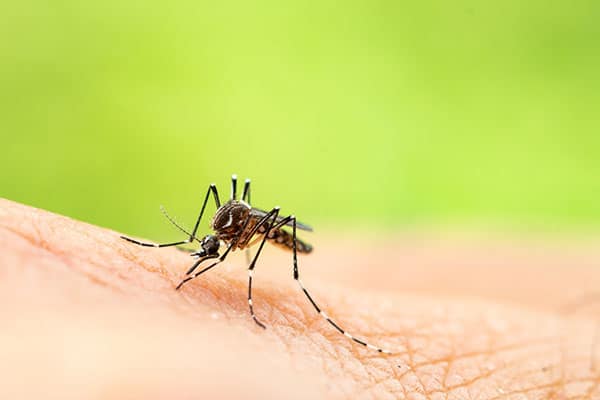Nothing destroys a summer barbecue, poolside party, or a hike through the woods quite like a hungry swarm of mosquitoes.
Americans used to think of them as mere pests. The itchy bites were annoying, but nothing that could cause any real damage to our health.
Those days are over.
Mosquitoes in the U.S., like in many other parts of the world, have become major carriers of serious diseases. Zika, West Nile, dengue, and chikungunya are now well established on our shores.i
Many people use chemical bug repellents as their first line of defense. But that’s like coating your body in toxins. The primary ingredient in many commercial sprays and lotions is the chemical DEET.
DEET stands for N, N-Diethyl-meta-toluamide. Exposure to it has been linked to memory loss, headaches, weakness, fatigue, muscle and joint pain, tremors, and breathing difficulties.ii
DEET is so corrosive that it will eat right through plastic and fabrics made of spandex and rayon. It even dissolves watch crystals and nail polish. Yet, the manufacturers say we should smear it on our skin.iii
The Best Non-Toxic Mosquito Solutions
You don’t have to poison yourself to ward off mosquitoes. There are natural, safe ways to keep the bugs away:
- Avoid dark clothing. Researchers at the University of Florida found that dark clothing attracts mosquitos.iv Mosquitos use their vision to search for food. The researchers theorize that dark colors make you stand out against the horizon. This makes it easier for mosquitos to see you.v Wear white or lighter colored clothing that blends in with the sky.
- Oil of lemon eucalyptus. Used in cosmetics for decades, this fragrance is a potent natural insect repellent. Researchers at the University of North Carolina at Chapel Hill found that products containing this oil ward off mosquitos for over 1 ½ hours after application. It was found to offer similar protection to low concentrations of DEET. You can find lemon eucalyptus oil in most health food stores or online. You can apply it full strength to clothing. But when using it on your skin you may want to dilute it to avoid irritation. A couple drops of lemon eucalyptus oil mixed with ½ to 1 teaspoon of coconut oil works well.
- Take vitamin B1. It hasn’t been tested in clinical trials, but users of vitamin B1 swear by its anti-mosquito properties. It’s also known as thiamine. Take 25-50 mg three times a day.vi
- Lavender oil. Mosquitos hate it. You can ward them off by putting drops of the oil in strategically placed bowls or plates. Or you can rub some on your skin. Growing lavender in your yard may also help keep away mosquitoes.vii
- Slow down. Mosquitos not only hunt by sight, but by smell. They are highly attracted to the scent of carbon dioxide (CO2). Your body emits CO2 through breathing. The more you move, the more CO2 your body generates. Pregnant women often complain they are targeted by mosquitoes. This may be because they emit more CO2 than other people.viii
- Hold my beer. Two studies have found that drinking beer increases mosquito bites. A 2010 study found that mosquitos were 30% more likely to go after beer drinkers. Dr. Grayson Brown of the University of Kentucky explains that frothy beer emits CO2. “CO2 comes bubbling out of a beer when it’s opened,” he said. “CO2 is going to attract mosquitoes.”ix When outside with mosquitoes, switch to another beverage.
- Throw rosemary on the grill. After you take the food off the grill, toss in a handful of rosemary. Dedicated barbecuers swear that the perfumed smoke is a natural mosquito repellent.x
- Apple cider vinegar. Mosquitos are drawn to acids that your body secretes from the pores in your skin. Drinking apple cider vinegar can help. Although it’s an acid, apple cider vinegar causes your skin to become more alkaline when you drink it. Add one or two tablespoons to 16 ounces of water and drink it. This will help neutralize your skin.xi xii
- Garlic. Colorado State University researchers found that rubbing crushed garlic on your skin can ward off bugs for hours. Of course, other humans might avoid you as well. This might be a good option for campers and fishermen who don’t have to worry about socializing.
One last thing….
If you do get bit, resist the urge to scratch. It only adds to the inflammation and discomfort.
Instead, place an ice cube on the bite for one minute. You may find the itch quickly goes away. Other people report that dabbing on a bit of hydrogen peroxide stops itching.
Editor’s Note: Discover natural, non-drug methods to transform your health. Read our monthly journal, Independent Healing. It’s your best source for unbiased, evidence-based medical information. Get all the details HERE.
Related Articles
New Natural Mosquito Repellent Works Better Than DEET
9 Mosquito-Repelling Plants that Protect You from Zika
Bug Bites Driving You Crazy? Don’t Scratch. Do This Instead.

